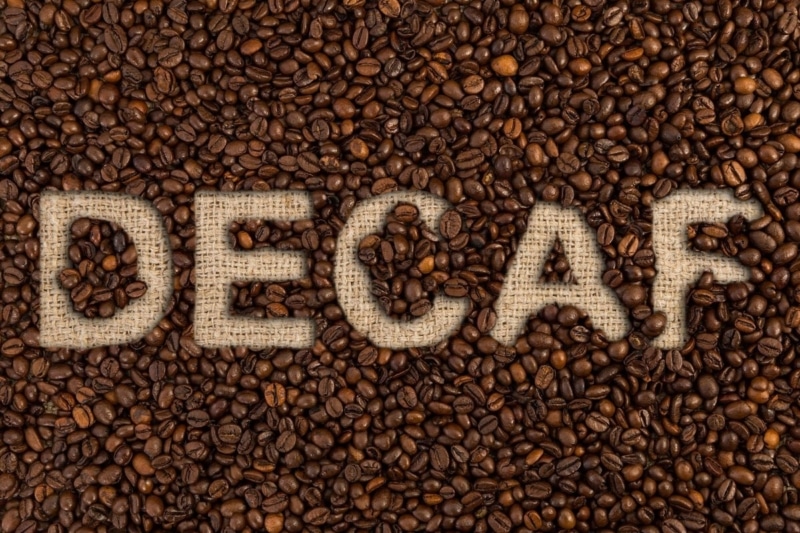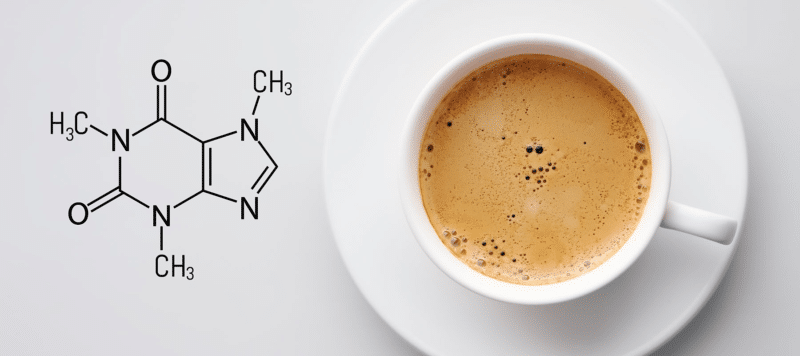
Coffee’s health effects are still controversial, but coffee has already become a favorite food for many people. The consumption of decaf coffee is also on the rise. So, today, we are going to find out what makes regular and decaf coffee different.
Contents
Why Do We Need To Consider Decaf Coffee?
Caffeine, when consumed in an appropriate amount, stimulates the central nervous system to clear the mind or is effective in repelling drowsiness.
However, when it becomes excessive, symptoms such as soreness, headache, and anxiety appear depending on the person. If caffeine is a problem, it might be okay to stop eating coffee, but that’s not the case again. This is because some people have to drink coffee to improve their work efficiency.
I don’t know the feelings of those who can’t let go of cigarettes because they don’t smoke, but I don’t think it’s very different from the one who keeps looking for coffee.

Decaf coffee comes as a great alternative for those who love coffee but need to limit caffeine intake for reasons of taste or health. Overall, decaf coffee is similar to regular coffee except that the caffeine has been removed.
The flavor and efficacy of decaf coffee are different from that of regular coffee. Knowing this, you need to adjust your intake according to your own reactions and symptoms after coffee consumption.
Then, How Is Decaf Coffee Made?
To know the history of decaf coffee, it was first made by Ludwig Roselius who was a German coffee businessman. He started to make decaf coffee because he believed that his father who was a coffee addict had suddenly died because of caffeine.
However, the appropriate amount of intake is good for health for several reasons, so, you do not need to worry about it at all.

After Roselius, many people have made decaf coffee in various ways, and the process seems complicated, but the principle is surprisingly simple.
Steaming green beans or soaking in hot water, using a chemical solvent, or immersing the coffee in a solution that has been extracted once will remove only the caffeine.
When these green beans are dried, they become decaffeinated green beans. Green decaffeinated coffee beans are roasted once with heat, like regular green coffee beans, and then extracted to complete a cup of coffee.
Decaf coffee is ground coffee with about 97% decaffeinated. There are several ways to remove caffeine from coffee beans, most of which are washed with water, organic solvents, or carbon dioxide until caffeine is extracted.
The nutritional composition of decaf coffee is almost the same as regular coffee except for the caffeine content. Additionally, the taste and aroma may become a little softer and the color may change depending on the detailed method.
Coffee is known to be rich in antioxidants such as polyphenols. However, decaf coffee can be up to 15% lower in antioxidants than regular coffee, and this difference is likely to occur in the decaffeinated process.
If So, Is Decaf Coffee Really Caffeine Free?
As you know, drinking coffee temporarily wakes you up, raises your mood, and increases your concentration. This is all due to the arousal effect of caffeine, which is contained in coffee.
People who are sensitive to caffeine cannot sleep at night even after drinking a cup of coffee in the evening or even in the afternoon. For such people, there is a coffee that has only been caffeinated from coffee. It is decaffeinated coffee. It is a coffee made by removing only the caffeine contained in the coffee while retaining the unique aroma and taste of coffee.

However, decaffeinated coffee does not remove 100% of the caffeine. Coffee is classified as caffeine-free even though it has 1% to 2% of caffeine remaining.
The standard of decaffeinated coffee varies depending on each country, but the international standard refers to coffee in which more than 97% of the caffeine has been removed. So, coffee with 90% or more removed is stipulated as caffeine-free coffee).
Therefore, a regular decaf cup of coffee may contain less than 10 milligrams of caffeine. Also, one study found that the amount of caffeine in a cup of decaf coffee (180 mL) contains about 0 to 7 mg. In other words, it is not completely caffeine-free, but considering that regular coffee contains about 70 to 140 mg of caffeine, depending on the dosage, you can see that the amount is very small.
When Caffeine Is Removed From Coffee, Will It Not Affect The Aroma And Taste of Coffee Or Other Nutrients?
Some say that the flavor of decaf coffee is weaker than that of regular coffee, some say that the extraction color is thinner and that the sensitive person feels the coffee taste bitter.
In fact, alkaloids dominate the bitter taste of coffee, one of which is caffeine. In other words, decaf coffee is a state in which caffeine has been removed, so the bitter taste has significantly decreased.

Also, during the decaffeinated process, other ingredients that exhibit coffee flavor may be lost in small amounts. Therefore, in order to show the flavor of decaffeinated coffee, roasting is performed a little more than regular coffee.
What is more, if the roasting is done incorrectly, the coffee flavor can become unattractive and feel bitter. As a result, especially in the case of decaf coffee, it is necessary to pay more attention to the roasting process.
How Does Decaf Coffee Affect Health?
Decaf coffee originated from an attempt to maintain the aroma and taste of coffee while removing caffeine as much as possible, so all ingredients contained in coffee other than caffeine remain intact.
Although some loss occurs in the process of removing caffeine, chlorogenic acid, hydrocinnamic acid, and polyphenols, which are antioxidants, remain intact like regular coffee.
Recent research findings that it helps prevent Parkinson’s disease, Alzheimer’s, liver cancer, colon cancer, type 2 diabetes, and gallstones apply to decaffeinated coffee.

Additionally, both regular coffee and decaf coffee can help reduce the risk of Type 2 diabetes. It is known that a cup of coffee each day can reduce your risk of developing diabetes by up to 7%. In addition, the chlorogenic acid contained in coffee has a positive effect on aging and neurodegenerative diseases.
If you are worried about heartburn when drinking coffee, drinking decaf coffee instead is a better option. Drinking decaf coffee reduces gastric acid reflux symptoms, a side effect of drinking regular coffee. Furthermore, drinking more than two cups of decaf coffee a day reduces the risk of rectal cancer by up to 45%.
Most studies on the efficacy of coffee did not distinguish clearly between regular coffee and decaf coffee, so specific health effects of decaf coffee are still in need of further research.
What Makes Regular Coffee Better Than Decaf Coffee?
Decaffeinated coffee was certainly a new coffee that made a mark in history, but it was not welcome for a while. The reason decaf coffee did not occupy a large proportion in the industry was that it tasted significantly inferior to regular coffee.
In the process, when the green beans are soaked in water and washed off, significant chemicals are also removed, and the caffeine, which makes the coffee’s bitter taste, decisively disappears, resulting in a bad taste.
To compensate for this, various methods such as the carbon dioxide method of dissolving caffeine in carbonated water have been created, but decaf coffee with one more process is inevitably influenced by the flavor of the industry.

Besides, regular coffee contains caffeine, a natural stimulant, which is effective in increasing attention and reducing fatigue. Effects such as increased metabolism, fat burning, and improved motor function appear only when you drink regular coffee.
However, the demand for decaf has increased recently. It is simply because decaf coffee is actually the only alternative for those who want to drink but can’t drink often or don’t consume caffeine.
For those who crave the act of drinking coffee itself, it may not be so important that it tastes a little less.
When To Choose Decaf Coffee?
There are individual differences in tolerance to caffeine, but drinking more than 400 mg of caffeine per day should be avoided for healthy adults.
Excess caffeine overwhelms the central nervous system, which can lead to anxiety, digestive problems, cardiac arrhythmias, and sleep disturbances.
Those who need to work overnight can drink regular coffee with caffeine after dinner, while those who want to fall asleep early but still want to feel the aroma and taste of coffee can drink decaffeinated coffee.

People who are sensitive to caffeine should remember that even decaffeinated coffee may contain some caffeine. This is because some people are unable to sleep unintentionally even with a cup of decaffeinated coffee that they drank in the evening.
They should limit their consumption of regular coffee and drink it as a substitute for decaf or tea. People with certain conditions may be taking prescription drugs that can interact with caffeine, so drinking decaf coffee is a better choice. The same goes for pregnant and lactating women, children, adolescents, and people with anxiety or sleep problems.
Then, Who Is Suitable To Drink Decaf Coffee?
Decaf coffee is difficult to predict the negative aspects or positive effects of caffeine that regular coffee has by removing caffeine.
When drinking regular coffee, the effect of improving metabolism caused by the action of caffeine, improving memory and reaction sensation, reducing the risk of depression and suicide, lowering the risk of cirrhosis and liver damage, and improving exercise performance cannot be expected.

There are also no negative side effects such as excitement and anxiety, digestive problems, and cardiac arrhythmia caused by caffeine.
Therefore, decaffeinated coffee is mainly selected by people who are sensitive to the caffeine content of regular coffee. Also, it is largely consumed by adolescents, mothers or breastfeeding women, and people with sleep anxiety problems.
These people are recommended to take as little caffeine as possible. Besides, it is also used in diet therapy where caffeine is limited. If you are a coffee lover, and soon to be on a diet, then decaf coffee is the perfect choice for you to satisfy your coffee addict.
Final Thoughts
In general, caffeine is unconditionally considered unhealthy. However, many studies have shown that caffeine is effective in dieting, preventing aging, and improving concentration.
As a result, each individual responds to caffeine to a strong and weak degree, so rather than thinking that caffeine is unconditionally bad, it is necessary to properly consume it according to one’s own body.
To sum up, whether it is regular or decaf coffee, each of them has its own benefits and side effects as well. It is important to understand personal symptoms and preferences to consume coffee correctly with appropriate amounts of caffeine. Always, remember that drinking coffee also requires smart drinking from regular coffee to decaf coffee.
References
